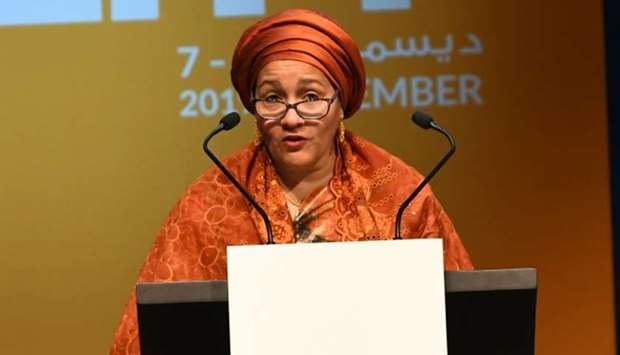A top United Nations (UN) official has highlighted the role of Qatar in addressing the challenges faced by people with disabilities.
“It is my great pleasure to join this historic international conference on disability and development. Allow me to begin by thanking Qatar for its leadership on this crucial change,” said Amina J Mohamed, Deputy Secretary-General of the United Nations.
Mohamed was speaking at the opening session of the two-day Doha International Disability and Development Conference taking place at the Qatar National Convention Centre.
“I would like to highlight the tireless efforts of Her Highness Sheikha Moza bint Nasser herself. She is one of the most dedicated advocates we have for improving education around the globe and ensuring that no one is left behind, especially persons with disabilities,” highlighted the UN official.
Emphasising the need for empowering people with disabilities, Mohamed highlighted four important measures to be followed.
“Firstly, some countries still need to work harder to increase the availability of high-quality, timely and reliable data, disaggregated by disability, to inform their approaches to disability inclusion. Secondly, resources are critical. Governments should be making disability inclusion a priority within their national budgets. Thirdly, we must improve accessibility. Accessibility is a precondition for the full inclusion and meaningful participation of persons with disabilities in our society. Finally, we need to support persons with disabilities in conflict and humanitarian settings,” she explained.
The official noted that in all regions, stigma faced by persons with disabilities abounds, compounded by a lack of understanding of their rights, and of the value of their contributions to society.
“This situation is untenable. It goes against collective commitment to human dignity, our obligations under international law and the strong business case for disability inclusion. It is up to us – leaders from the government, business, civil society, organisations of persons with disabilities, international organisations and others – to turn this situation around,” she stressed.
The official also suggested to have more people with disabilities at the workplace and in social activities.
“One of the single-most effective ways to change mindsets is to have more and more persons with disabilities in our offices and in our midst. We must be the change we want to see. I urge all actors – particularly States Parties to the Convention (on the Rights of Persons with Disabilities) and their international partners – to be more ambitious in implementing their commitments to disability-inclusive development,” Mohamed added.
Mohamed was speaking at the opening session of the two-day Doha International Disability and Development Conference taking place at the Qatar National Convention Centre.
“I would like to highlight the tireless efforts of Her Highness Sheikha Moza bint Nasser herself. She is one of the most dedicated advocates we have for improving education around the globe and ensuring that no one is left behind, especially persons with disabilities,” highlighted the UN official.
Emphasising the need for empowering people with disabilities, Mohamed highlighted four important measures to be followed.
“Firstly, some countries still need to work harder to increase the availability of high-quality, timely and reliable data, disaggregated by disability, to inform their approaches to disability inclusion. Secondly, resources are critical. Governments should be making disability inclusion a priority within their national budgets. Thirdly, we must improve accessibility. Accessibility is a precondition for the full inclusion and meaningful participation of persons with disabilities in our society. Finally, we need to support persons with disabilities in conflict and humanitarian settings,” she explained.
The official noted that in all regions, stigma faced by persons with disabilities abounds, compounded by a lack of understanding of their rights, and of the value of their contributions to society.
“This situation is untenable. It goes against collective commitment to human dignity, our obligations under international law and the strong business case for disability inclusion. It is up to us – leaders from the government, business, civil society, organisations of persons with disabilities, international organisations and others – to turn this situation around,” she stressed.
The official also suggested to have more people with disabilities at the workplace and in social activities.
“One of the single-most effective ways to change mindsets is to have more and more persons with disabilities in our offices and in our midst. We must be the change we want to see. I urge all actors – particularly States Parties to the Convention (on the Rights of Persons with Disabilities) and their international partners – to be more ambitious in implementing their commitments to disability-inclusive development,” Mohamed added.


